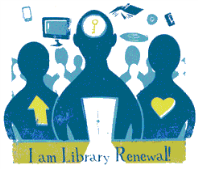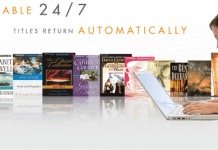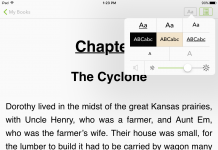 Been there. Done that. Some years ago I cofounded a noncommercial startup called LibraryCity—the same name as this Web site—to try to get millions of books online.
Been there. Done that. Some years ago I cofounded a noncommercial startup called LibraryCity—the same name as this Web site—to try to get millions of books online.
We ran into a little complication: Google’s book side blew us away. LibraryCity did prod the International Digital Publishing Forum into getting serious about e-book standards, by way of ePub. But as small-fry, not wired into the worlds of the super-rich, big business, foundations, and national politics, we lacked the clout to promulgate our own standards and build the digital library.
 Now another grassroots startup, Library Renewal, led by Michael “Library Man” Porter, wants to create a library system online to give libraries a better deal than OverDrive is. I wish Michael all kinds of luck, and meanwhile here is my advice. Keep plugging away, but don’t do it without cooperating closely with the Harvard-hosted Digital Public Library of America on a common infrastructure, and share lots content in both directions. Library Renewal and other public library organizations could still have their own system focused on the community library needs online and offline, while the DPLA or a spin-off concentrated on an academic system.
Now another grassroots startup, Library Renewal, led by Michael “Library Man” Porter, wants to create a library system online to give libraries a better deal than OverDrive is. I wish Michael all kinds of luck, and meanwhile here is my advice. Keep plugging away, but don’t do it without cooperating closely with the Harvard-hosted Digital Public Library of America on a common infrastructure, and share lots content in both directions. Library Renewal and other public library organizations could still have their own system focused on the community library needs online and offline, while the DPLA or a spin-off concentrated on an academic system.
 Here are a few other talking-and-thinking points for both Michael and John Palfrey (photo), his DPLA counterpart—timely concerns right now. Leaders from both are at the Public Library Association gathering in Philadelphia. If they don’t meet there, I hope they’ll connect via phone and the Net and meanwhile ponder such matters as:
Here are a few other talking-and-thinking points for both Michael and John Palfrey (photo), his DPLA counterpart—timely concerns right now. Leaders from both are at the Public Library Association gathering in Philadelphia. If they don’t meet there, I hope they’ll connect via phone and the Net and meanwhile ponder such matters as:
1. The need to avoid the wrong kind of entrepreneurial zeal. One reason Michael isn’t cooperating closely with the DPLA is that he feared he and colleagues would have to sign over their work to Harvard. I don’t know all the details. But both groups should think as little as possible in proprietary terms about ideas and technology, while still giving conspicuous credit through personal and organizational mentions. Whatever the case, try not to replicate Silicon Valley’s ego-and-tech wars. I love the DPLA’s goal of keeping code and metadata and other technology open and hope that this approach will persist. Will Library Renewal make the same commitment?
Please note that the right kind of entrepreneurial spirit could help immensely—see LibraryCity’s post headlined Toward an e-library ecosystem: Public libraries will screw themselves if they don’t learn from Amazon’s comprehensive “seamless approach.” That was, of course, a response to the famous “Libraries are screwed” comments of Eli Neiburger, a Library Renewal board member. No, they needn’t be! Libraries are about much more than just books, but they’re the main brand, and I even want libraries to remain in the bestseller business: nurture writers, hire experienced editors, and grow your own hits! I also want libraries to come up with apps and technical standards that will help people with different e-reading devices synchronize “last-page read” and the rest as smoothly as the Kindle does. Commercial? Yes. But not obnoxiously so. And the commerce would be just a means, a helpful revenue stream, not the reason to exist.
Furthermore, there should still be a place for for-profit bookstores and publishers. I’d love to see the library system—simply by serving America’s e-libraries and patrons—help publishers significantly grow revenue. Respect healthy diversity, not just of content but of business models!
2. Avoidance of compromising business and technological alliances, formal or informal.
Both groups need to exercise vigilance in this regard. I don’t want the DPLA to be a captive of information industry; as much as possible it should create and aggregate content on its own rather than simply farming out the task to the usual suspects. To some extent middlemen will be unavoidable, but the goal should be to self-reliance when it provides the most value. This is one reason why I’m so gung ho on a library takeover and reinvention of OverDrive, the market leader in distributing e-books to U.S.-public libraries (even though it’s heavily reliant on Amazon).
As for Library Renewal, it will be partnering up with technology companies, and I see it already has relationship with the attorneys of Wilson Sonsini Goodrich & Rosati, which describes itself as “The premier provider of legal services to technology, life sciences, and growth enterprises worldwide.” I’d love to more about the WSGR relationship and others. What does WSGR they expect in return for itself and clients other than Library Renewal itself? No improprieties alleged! This simply goes along with another talking point…
3. Openness. LibraryCity has not been shy in calling for the DPLA to open itself up more fully to the public, and while this is still a work in progress, the organization let me attend a crucial governance-workshop and will try to make its workshop meetings more easy to keep up with from afar. I’m optimistic.
Similarly, Library Renewal should post meeting notes online if it is not doing so already—even at an early stage. Act from the start like a public library, build that into your culture, and people someday will be more open to the prospect of your serving them.
At LibraryCity, we were so busy wrestling with technology and content matters that we could not be as diligent on governance matters as we would have liked. Had this happened, we probably still would not have drawn major funding, but at least it would have been more likely. Part of the problem was that not enough librarians at the time understood the potential of e-books and other digital content, so we couldn’t attract the volunteers we needed to give us time topay more attention to governance details. In this era of Kindles and iPads, matters will be easier in that regard for Library Renewal.
4. The need for the DPLA and LibraryRenewal to start cooperating ASAP on technological matters at the grassroots level and otherwise. Nate Hill, a San Jose librarian and as well as a blogger for the Public Library Association, has started a wiki to help design a summer reading application that the DPLA could share with the public library world. Library Renewal and similar groups should participate in the app’s development in an advisory sense if nothing else, and include their own technology projects in the wiki, so the library world can offer feedback. My own hunch is that this won’t draw massive participation from grassroots librarians, but I’d love to be wrong. Besides, lack of mass interest in all the details is one more reason why the two groups should be working closely to make the best of their resources. The results ideally will be like the Net in time—underappreciated at first, but ultimately just like the Internet: a source of enlightenment for millions.
5. Other forms of participation. In outreach, both groups could complement each other well. The DPLA’s Audience and Participation Workshop in Dallas consisted of just 20 or so invited participants, and three school librarians, expected to come, never showed up. By contrast, Library Renewal has drawn its share of attention on Facebook and elsewhere, with a fraction of the DPLA’s resources, and has some leading public librarians on its board, even if the group has not captured the interest of the top library luminaries at the national level. Connections with even a prominent tech law firm are no substitute.
The DPLA does have the attention of people at such places as the Library of Congress, National Archives, and the Institute for Museum and Library Services. Hard to beat. The Obama White House has even honored Harvard Prof. Robert Darnton, the proposer of the DPLA, with a National Humanities award for “his determination to make knowledge accessible to everyone”; and even though John Palfrey has distinguished himself over the years on his own without maternal help, it doesn’t hurt that his mother is executive director of Michelle Obama’s “Let’s Move” fitness initiative. Simply put, objectively, the DPLA is far better positioned to lobby for major funding nationally, while I see Library Renewal as closer to the grassroots. Both could strengthen each other through honest and open interactions.
Both groups should offer each other candid feedback and participate on its others email lists debating The Great Issues (does Library Renewal have a list with the entire world able to participate—the way the DPLA has a bunch of them?).
Candor is not the same as hostility. At Library Renewal, as revealed in a Dquarium podcast, Michael wonders why LibraryCity is so outspoken against the inclusion of “Public” in the name of the DPLA’s name. That’s because America has its share of misinformed people who see online libraries as a replacement for brick-and-mortar public libraries, and you can bet that if the P remains, then the DPLA’s existence will be used as Exhibit A or at least a major reason. Some key participants in the DPLA agree with me, and I would love to see Library Renewal join me and others in making certain the DPLA gets it right. Same for the issue of “one big tent” vs. separate but intertwined public and academic systems. Insist on this! Don’t sweep these matters under the rug—just don’t get personal about it.
Lest people still think that the DPLA-Library Renewal issue isn’t worthy of discussion, keep in mind if nothing else the ALA angles. Maureen Sullivan, ALA president elect, is a big supporter of the DPLA, just as I am. Gina Milsap, ALA presidential candidate with help from David King, whose boss works for her in Topeka, Kansas, is on the board of Library Renewal just as David himself is. With such bothersome threats to the library world as miserly politicians, e-book price hikes, and some publishers’ refusal even to make their digital books available libraries, it is all the more important for librarians within ALA to seek unity within reasonable bounds. Yes, good fences make good neighbors. But remember, everyone should still be exactly that—good neighbors.
Similar Posts:
- National Digital Public Library conference: A little progress toward a two-system approach—to help both public and academic libraries?
- Who needs ‘social worker’ librarians? Just ‘type into the search box’? Something for the DPLA to consider June 13 in the P controversy?
- “Newport Beach may close Balboa branch, open ‘electronic’ library”: Many are shunning books. How to restore their popularity—and protect the public library model?
- Hello, ALA? Open-mindedness and an e-book ecosystem would be the best responses to prices increases from Random House—and other challenges
- Attn. DPLA! Pay attention to Colorado and California e-library bypasses of OverDrive and consider your own distribution as much as possible
(Via LibraryCity.)

































